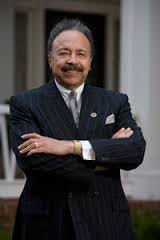 Dr. William R. Harvey has been guiding Hampton University as president since 1978.
Dr. William R. Harvey has been guiding Hampton University as president since 1978.The U.S. Department of Education announced the 24 colleges and universities who cumulatively were awarded $75 million from the First In The World (FITW) four-year grants program. Almost 500 institutions applied after the grants program was proposed in May.
Of 24 grant-winning colleges, 6 are minority-serving institutions, including Hampton University, the lone historically Black school to share in the awards. These institutions will receive a total of $20 million out of the $75 million. Hampton University will get $3.5 million.
“We were incredibly encouraged that of the winners, six of the winning dockets came from minority serving institutions,” said Ted Mitchell, Under Secretary of the U.S. Department of Education, during a teleconference Tuesday that included presidents of the grant-winning schools. “These are institutions whose mission it is, and whose demographics make certain, that they serve populations of first-generation students, racial minority [and] low-income students. We are especially gratified that those institutions have taken the innovation challenge.”
FITW is designed to reward and help college and universities that are taking an innovative approach to increasing college completion, value and affordability. All institutions that receive a grant must develop projects that address at least one of the following priorities: increasing college access and completion, increasing community college transfer rate, increasing STEM enrollment and reducing the time to completion.
Hampton University’s targeted student beneficiaries of the grants are those who declare a STEM major. Over the next four years, it aims to serve 1,065 students in STEM. The university will use the grant funding to redesign many of its math courses; include more project-based learning; create a math emporium and a summer bridge program; and invest in faculty development.
“I share President Obama’s goal, as well as the goal of the secretary, and others, on the whole concept of access and affordability. We’ve been working at this for a long time,” said Hampton University President William R. Harvey.
President G. Edward Hughes, of Gateway Technical and Community College in Florence, Kentucky, said in the teleconference that his institution’s FITW grant of almost $3.3 million would go to ensure a faster time to completion for students. “We want to accelerate the time to completion for our students by redesigning developmental education, so that our students with developmental needs will immediately be placed in their credit-bearing courses in their field of study. The faster we get them into their program courses we know the better they will complete their programs,” Hughes said.
Mitchell said that the grants program is part of the federal government’s effort to help aid innovation at institutions of higher education. “One of the things that we want to come out of this is an answer to that question: what are the barriers that these innovators run into that are created either by the existence of federal policy or the absence of federal policy, and can we, as these innovations move forward, keep track of those trying to settle accounts and move things where they can?” Mitchell said.
The DOE hopes that the grants will give institutions the freedom to innovate. “I say all the time that the best solutions to our greatest educational challenges won’t come from anyone here in Washington, but rather great schools and great presidents like the ones who successfully competed for these awards,” said Arne Duncan, the secretary of education.
Staff writer Catherine Morris can be reached at [email protected].





















